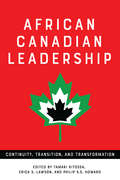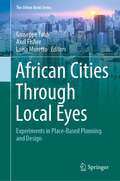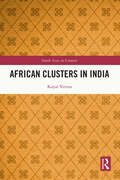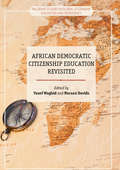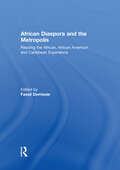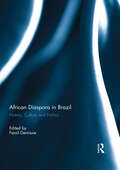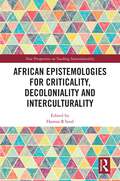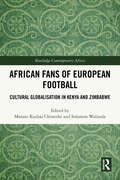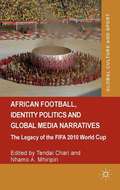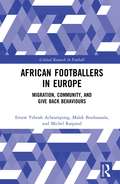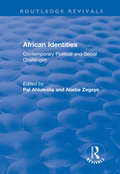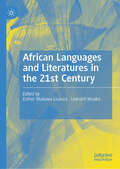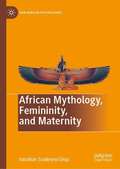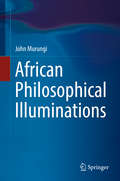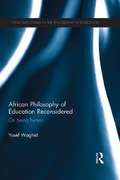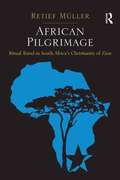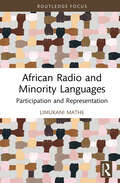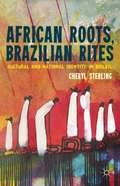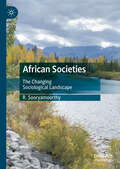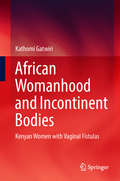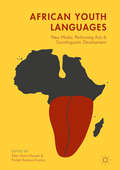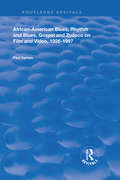- Table View
- List View
African Canadian Leadership: Continuity, Transition, and Transformation
by Tamari Kitossa Erica S. Lawson Philip S.S. HowardChallenging the myth of African Canadian leadership "in crisis," this book opens a broad vista of inquiry into the many and dynamic ways leadership practices occur in Black Canadian communities. Exploring topics including Black women’s contributions to African Canadian communities, the Black Lives Matter movement, Black LGBTQ, HIV/AIDS advocacy, motherhood and grieving, mentoring, and anti-racism, contributors appraise the complex history and contemporary reality of blackness and leadership in Canada. With Canada as a complex site of Black diasporas, contributors offer an account of multiple forms of leadership and suggest that through surveillance and disruption, practices of self-determined Black leadership are incompatible with, and threatening to, White "structures" of power in Canada. As a whole, African Canadian Leadership offers perspectives that are complex, non-aligned, and in critical conversation about class, gender, sexuality, and the politics of African Canadian communities.
African Cities Through Local Eyes: Experiments in Place-Based Planning and Design (The Urban Book Series)
by Giuseppe Faldi Axel Fisher Luisa MorettoThis book provides readers with a wide overview of place-based planning and design experiments addressing such powerful transformations in the African built environment. This continent is currently undergoing fast paced urban, institutional and environmental changes, which have stimulated an increasing interest for alternative architectural solutions, urban designs and comprehensive planning experiments. The international and balanced array of the collected contributions explore emerging research concepts for understanding urban and peri-urban processes in Africa, discuss bottom-up planning and design practices, and present inspirational and innovative co-design methods and participatory tools for steering such change through public spaces, sustainable services and infrastructures. The book is intended for students, researchers, decision-makers and practitioners engaged in planning and design for the built environment in Africa and the Global South at large.
African Clusters in India (South Asia in Context)
by Koyal VermaAfrican Clusters in India examines the discrimination and stereotypes faced by the African migrants in India. It outlines the narratives of the migrants and demonstrates how their ‘African identity’ gets associated with drugs, prostitution, and cannibalism. The book brings to the fore how the African migrants experience racial profiling based on a conflated African identity, and how this identity gets generalised irrespective of their different nationalities and leads to social exclusion. This monograph argues that the antagonistic urban environment facilitates the formation of a pan-African identity as a response to biases and stereotypes. It also explores the role of language, culture, and politics of representation to show the process of othering and exclusion in India. Drawing on lived experiences of the migrants, the volume engages with the larger discourse of globalization, liberalisation, and migration within the global south. It will be of great interest to scholars and researchers of critical race theory, ethnography, urban sociology, African studies, and South Asian studies
African Democratic Citizenship Education Revisited (Palgrave Studies in Global Citizenship Education and Democracy)
by Nuraan Davids Yusef WaghidThis edited collection explores how democratic citizenship education manifests across the African continent. A recognition of rights and responsibilities coupled with an emphasis on deliberative engagement among citizens, while not uniquely African, provides ample evidence that the concept can most appropriately be realised in relation to its connectedness with experiences of people living on the continent. Focussing on a diverse collection of voices, the editors and authors examine countries that have an overwhelming allegiance to democratic citizenship education. In doing so, they acknowledge that this concept, enveloped by a certain Africanness, has the potential to manifest in practices across the African continent. By highlighting the success of democratic citizenship education, the diverse and varied contributions from across this vast continent address the malaise in its implementation in countries where autocratic rule prevails. This pioneering volume will be an invaluable resource for researchers and students working in the fields of education and sociology, particularly those with an interest in education policy, philosophy of education and global citizenship initiatives.
African Diaspora and the Metropolis: Reading the African, African American and Caribbean Experience
by Fassil DemissieAt the end of the 19th and at the beginning of the 20th century, a number of African American and Caribbean intellectuals and immigrants of the African Diaspora with all their apprehensions set out in steamships en route and carried with them a certain presence to the metropoleis of Europe and North America. These individuals traversed the "middle passage" in the opposite direction from the forced journey undertaken by their enslaved ancestors. Later they began to arrive in large numbers as free men and women in London, Paris, Berlin, Madrid, Brussels, Lisbon, New York, and other places in the metropolis by steam ships and later by planes, and were actors in the larger history of empire from which the imperatives of forced migration, uprooting, displacement, and exile had arisen.The texts selected offer critical examination of a broad range of African Diaspora experiences in the metropole drawn from Senegal, the Caribbean, United States, Britain, Nigeria and France. Bringing together comparative and diasporic perspectives, the book explores the complex roles that race, gender, sexuality and history have played in the formation of African Diaspora identities in the metropole since the 19th century.This book was published as a special issue of African and Black Diaspora: An International Journal.
African Diaspora in Brazil: History, Culture and Politics
by Fassil DemissieThe term 'Black Atlantic' was coined to describe the social, cultural and political space that emerged out of the experience of slavery, exile, oppression, exploitation and resistance. This volume seeks to recast a new map of the 'Black Atlantic' beyond the Anglophone Atlantic zone by focusing on Brazil as a social and cultural space born out of the Atlantic slave trade.The contributors draw from the recently reinvigorated scholarly debates which have shifted inquiry from the explicit study of cultural 'survival' and 'acculturation' towards an emphasis on placing Africans and their descendants at the center of their own histories. Going beyond the notion of cultural 'survival' or 'creolization', the contributors explore different sites of power and resistance, gendered cartographies, memory, and the various social and cultural networks and institutions that Africans and their descendants created and developed in Brazil. This book illuminates the linkages, networks, disjunctions, sense of collective consciousness, memory and cultural imagination among the African-descended populations in Brazil.This book was originally published as a special issue of African and Black Diaspora: An International Journal.
African Epistemologies for Criticality, Decoloniality and Interculturality (New Perspectives on Teaching Interculturality)
by Hamza R'BoulThis book addresses the underrepresentation and, more importantly, the misrepresentation of African epistemologies and traditions of thought in making sense of, theorizing, and doing interculturality.Africa remains (probably) the most oppressed and silenced sphere throughout centuries of colonialism and contemporary coloniality. Therefore, such an anthology provides a platform for those insights that have substantial epistemic capacity to alter our taken‑for‑granted notions of what interculturality is and what it is about. While a number of works have charted the contributions of African epistemologies in advancing our understanding of our intercultural realities, this book argues that the processes of decoloniality through and within interculturality have never been about (under) (mis)representation per se, but about how the politics of representation can provide inaccurate, tokenistic, and false inclusion. This book aims to substantiate the notion that decoloniality and interculturality are mutually inclusive, to demonstrate the affordances of African epistemologies in advancing intercultural knowledge, and to support the need to make visible philosophical and power‑literate approaches to interculturality.This book will be essential reading for scholars and students interested in African philosophy, African epistemology, and, more broadly, interculturality and intercultural communication.
African Fans of European Football: Cultural Globalisation in Kenya and Zimbabwe (Routledge Contemporary Africa)
by Manase Kudzai Chiweshe Solomon WaliaulaThis book examines the increasing influence of European football in African societies, considering the processes and significance of being a fan and what this means for the wider globalisation of popular culture.Focussing on fan cultures in Kenya and Zimbabwe, the book argues that instead of manifestations of neo-colonialism, African fandoms of European football are practised in ways that resonate with and help reconstruct and perform the socio-cultural substance of the African communities in question. European football is therefore instrumentalised to help define the identities of the members of the fandom communities and articulate their experience of their reality in their immediate circumstances.This book reflects how the global and local can coalesce in cultural trends such as football fandom. It will interest sports, leisure, popular culture, and social anthropology researchers in Africa and beyond.
African Football, Identity Politics and Global Media Narratives
by Tendai Chari Nhamo A. MhiripiriThis edited volume addresses key debates around African football, identity construction, fan cultures, and both African and global media narratives. Using the 2010 FIFA World Cup in South Africa as a lens, it explores how football in Africa is intimately bound up with deeper social, cultural and political currents.
African Footballers in Europe: Migration, Community, and Give Back Behaviours (Critical Research in Football)
by Ernest Yeboah Acheampong Malek Bouhaouala Michel RaspaudAfrican Footballers in Europe traces the social and economic evolution of African football and examines the strategies and resources that players mobilise in their migrations, with a particular focus on ‘Give Back Behaviours’ (how players contribute to their countries or communities of origin). It shines new light on contemporary migrations, labour markets in sport, and processes of development in Africa. Using a multidisciplinary approach and Weberian methodology to analyse players’ 'Give Back' behaviour, the book highlights the complex rationale behind this behaviour, based on a combination of social, cultural, and economic elements. It features interviews with former and current African professional players, providing a vivid picture of the role of communities in players’ migration projects, the allure of the European football market, and investment initiatives that can contribute to local and regional development. This is a vital read for academics, researchers, and students of sport sciences, sociology of sport, sport management, sociology, geography, political sciences, management, sociology of Africa, migration studies, sociology of the labour market, and economic sociology. It is also an important resource for professional organisations, NGOs, football agents, football administrators, federations, confederations, and governments.
African History through Sources
by Nancy J. JacobsAfrican History through Sources recounts the history of colonial Africa through more than 100 primary sources produced by a variety of actors: ordinary men and women, the educated elite, and colonial officials. Including official documents, as well as interviews, memoirs, lyrics, and photographs, the book balances coverage of the state and economy with attention to daily life, family life, and cultural change. Entries are drawn from all around sub-Saharan Africa, and many have been translated into English for the first time. Introductions to each source and chapter provide context and identify themes. African History through Sources allows readers to analyze change, understand perspectives, and imagine everyday life during an extraordinary time.
African Identities: Contemporary Political and Social Challenges (Routledge Revivals)
by Pal Ahluwalia Abebe ZegeyeThis title was first published in 2003. Aimed at examining contemporary debates and issues which are at the cutting edge of the social sciences, Pal Ahluwalia and Abebe Zegeye have put together a book on subjects of critical importance to the African condition. A combination of empirical and theoretical materials, this text introduces new perspectives.
African Languages and Literatures in the 21st Century
by Esther Mukewa Lisanza Leonard MuakaThis edited book examines the crucial role still played by African languages in pedagogy and literatures in the 21st century, generating insights into how they effectively serve cultural needs across the African continent and beyond. Boldly positioning African languages as key resources in the 21st century, chapters focus on themes such as language revolt by marginalized groups at grassroots level, the experience of American students learning African languages, female empowerment through the use of African languages in music, film and literary works, and immigration issues. The contributions are written by scholars of language, literature, education and linguistics, and the book will be of interest to students and scholars in these and related areas.
African Mythology, Femininity, and Maternity (Pan-African Psychologies)
by Ismahan Soukeyna DiopThis book explores feminine archetypes and mythological figures in African and European traditions with an underlying goal of describing the foundations of social status for women. The author provides a rich corpus of mythology and tales to illustrate aspects of female and mother-daughter relationships. Diop analyzes the symbolic aspects of maternity and femininity, describing the social meaning of the matrix, breasts, and breastfeeding. A retrospective of female characters in African literature brings an interesting approach to explore the figures of femininity and maternity in society. After an extensive analysis of African mythology and tales, the author proposes a way to integrate them in the clinical psychotherapy as a projective material. The analysis of clinical cases offers an example of how this material can be used in therapy with women from African descent.
African Philosophical Illuminations
by John MurungiThe illumination of African philosophy offered in this volume leads to the illumination of philosophy in general. Illuminating arises as an essential task of philosophy, whether African or not. What is illuminated is not already there, but is constituted at the moment of illumination. This book invites the reader to participate in the illuminating work of philosophy and necessarily, thereby, to contribute to his or her own self-constituting self-illumination. Although the focus is on African philosophy, the book also bridges the gap between African philosophy and other branches. Today more than ever, a bridging philosophy is called for, and this book helps to meet that need. This book poses philosophical questions such as who is an African and what Africa is, and seeks philosophical answers. In doing so, it contributes to the ongoing discourse on African philosophy. It addresses such issues as the African grounding of philosophy, the difference between African and Black philosophy, the African body, African art as expressed in and by Chiwara, the plight of African trees as the plight of Africans, and the symbolic meaning of Robben Island.
African Philosophy of Education Reconsidered: On being human (New Directions In The Philosophy Of Education Ser.)
by Yusef WaghidMuch of the literature on the African philosophy of education juxtaposes two philosophical strands as mutually exclusive entities; traditional ethnophilosophy on the one hand, and �scientific� African philosophy on the other. While traditional ethnophilosophy is associated with the cultural artefacts, narratives, folklore and music of Africa�s peop
African Pilgrimage: Ritual Travel in South Africa's Christianity of Zion
by Retief MüllerYears after the end of Apartheid South Africa remains racially polarized and socially divided. In this context pilgrimage and travelling rituals serve to help those who often find themselves at the bottom end of the social ladder to make sense of their world. This book describes a South Africa that is made up of a number of different fragmented worlds. The focus is on the Zion Christian Church, one of the largest religious movements in southern Africa, and a good example of indigenized African Christianity. Pilgrimage plays an important role in reintegrating some of those fragmented worlds into something approaching wholeness. This book tells the story of how the enduring ritual of pilgrimage is transforming African religion, along with the lives of ordinary South Africans.
African Radio and Minority Languages: Participation and Representation (Routledge African Media, Culture and Communication Studies)
by Limukani MatheWithin Africa, radio provides an important platform for accommodating diverse linguistic groups and enabling speakers to express themselves in their own local languages. This book investigates how radio broadcasting across the continent provides a platform for cultural participation and the representation of minority language speakers in a contested public sphere. In African media, a fierce contest wages for representation and participation, in which majority languages often emerge at the exclusion of minority ethnolinguistic groups. This book considers the important role that radio can play in broadcasting in minority languages. Drawing on in-depth original analysis, ethnographic observation and interviews with minority language radio hosts and guests from across South Africa, Zimbabwe, Nigeria, Malawi, Namibia, Mozambique, Lesotho and Kenya, this book considers to what extent African radio is accommodative of minority languages and what the challenges and prospects are for this. Ultimately, the book argues that radio’s three-tier system of broadcasting through analogue and digital radio leaves the medium of radio particularly well placed to provide equal access for ethnolinguistic groups in Africa.This ambitious and broad-ranging study will be an essential read for scholars and students of media studies and sociolinguistics in Africa.
African Roots, Brazilian Rites
by Cheryl SterlingThis text explores how Afro-Brazilians define their Africanness through Candomblé and Quilombo models, and construct paradigms of blackness with influences from US-based perspectives, through the vectors of public rituals, carnival, drama, poetry, and hip hop.
African Societies: The Changing Sociological Landscape
by R. SooryamoorthyThis book addresses a notable gap in African sociological knowledge by leveraging extensive empirical data covering all 54 African countries and drawing on historical insights from across the continent. Offering a nuanced understanding of African society, it signifies an unprecedented endeavour committed to unravelling the intricate tapestry of African society. The analysis presented in the book goes into the dynamic evolution of sociological topics, their interconnections with African knowledge, the identification of contemporary themes, methodological diversity, and contemporary challenges and issues of indigenisation, decolonisation, and promoting an Africa-centered sociology.
African Studies: Political Thought and the Public Sphere in Tanzania
by Emma HunterPolitical Thought and the Public Sphere in Tanzania is a study of the interplay of vernacular and global languages of politics in the era of decolonization in Africa. Decolonization is often understood as a moment when Western forms of political order were imposed on non-Western societies, but this book draws attention instead to debates over universal questions about the nature of politics, concept of freedom and the meaning of citizenship. These debates generated political narratives that were formed in dialogue with both global discourses and local political arguments. The United Nations Trusteeship Territory of Tanganyika, now mainland Tanzania, serves as a compelling example of these processes. Starting in 1945 and culminating with the Arusha Declaration of 1967, Emma Hunter explores political argument in Tanzania's public sphere to show how political narratives succeeded when they managed to combine promises of freedom with new forms of belonging at local and national level.
African Womanhood and Incontinent Bodies: Kenyan Women with Vaginal Fistulas
by Kathomi GatwiriThis book reveals the structures of poverty, power, patriarchy and imperialistic health policies that underpin what the World Health Organization calls the “hidden disease” of vaginal fistulas in Africa. By employing critical feminist and post-colonial perspectives, it shows how “leaking black female bodies” are constructed, ranked, stratified and marginalised in global maternal health care, and explains why women in Africa are at risk of developing vaginal fistulas and then having adequate treatment delayed or denied. Drawing on face-to-face, in-depth interviews with 30 Kenyan women, it paints a rare social portrait of the heartbreaking challenges for Kenyan women living with this most profound gender-related health issue – an experience of shame, taboo and abjection with severe implications for women’s wellbeing, health and sexuality. In absolutely groundbreaking depth, this book shows why research on vaginal fistulas must incorporate feminist understandings of bodily experience to inform future practices and knowledge.
African Women: Three Generations
by Mark Mathabane"This gripping saga by the author of Kaffir Boy presents a truthful, passionate, and illuminative biography of his great-grandmother, grandmother, and mother in South Africa. Mathabane vividly describes the shocking, heartbreaking stories of each generation of women as they struggle for independent incomes to support themselves and their children; while resisting apartheid, they must also resist the traditions imposed by their own society and the oppresion imposed by their men. The stories are an inspiration and tribute to millions of women worldwide in similar conditions. A thought-provoking book that is sure to deliver a strong message all who read it."--From Libary Journal
African Youth Languages: New Media, Performing Arts And Sociolinguistic Development
by Ellen Hurst-Harosh Fridah Kanana ErastusThis book showcases current research on language in new media, the performing arts and music in Africa, emphasising the role that youth play in language change and development. The authors demonstrate how the efforts of young people to throw off old colonial languages and create new local ones has become a site of language creativity. <P><P>Analysing the language of ‘new media’, including social media, print media and new media technologies, and of creative arts such as performance poetry, hip-hop and rap, they use empirical research from such diverse countries as Cameroon, Nigeria, Kenya, the Ivory Coast and South Africa. <P>This original edited collection will appeal to students and scholars of African sociolinguistics, particularly in the light of the rapidly changing globalized context in which we live.
African-American Blues, Rhythm and Blues, Gospel and Zydeco on Film and Video, 1924-1997 (Routledge Revivals)
by Paul VernonFirst published in 1999, the main part of this reference consists of an alphabetical listing of many hundreds of artists, with details on band personnel, instrumentation, location, titles performed, sources, and other relevant notes included in each listing.
